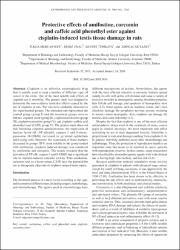Protective effects of amifostine, curcumin and caffeic acid phenethyl ester against cisplatin-induced testis tissue damage in rats
Citation
Mercantepe, T., Unal, D., Tümkaya, L., & Yazici, Z. A. (2018). Protective effects of amifostine, curcumin and caffeic acid phenethyl ester against cisplatin-induced testis tissue damage in rats. Experimental and therapeutic medicine, 15(4), 3404–3412. https://doi.org/10.3892/etm.2018.5819Abstract
Cisplatin is an effective antineoplastic drug that is usually used to treat a number of different types of cancer in the clinic. One of the most notable side effects of cisplatin use is infertility. the present study was designed to determine the non-oxidative testicular effects caused by the use of cisplatin in rats. the rats were randomly allocated to the experimental groups. the untreated rats represented the control group (group I) and the treatment groups were as follows: cisplatin alone (group II), cisplatin+amifostine (group III), cisplatin+curcumin (group IV), and cisplatin+caffeic acid phenethyl ester (CAPE; group V). the present study observed that following cisplatin administration, the expression of nuclear factor-B (NF-)/p65, caspase-3 and 8-deoxyguanosine (8-OHdG) increased in germinal epithelium and Leydig cells. However, the expression of these markers decreased in groups III-V, most notably in the group treated with amifostine. cisplatin induced-damage was countered by amifostine and curcumin. the results revealed that the activation of NF-B, caspase-3 and 8-OHdG had a significant role in cisplatin-induced testicular toxicity. Thus, amifostine, curcumin and, to a lesser extent, CAPE have the potential for use as therapeutic adjuvants in cisplatin-induced testis injury.


















